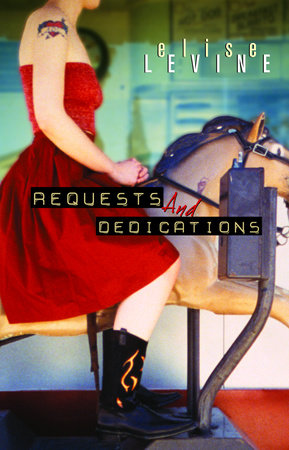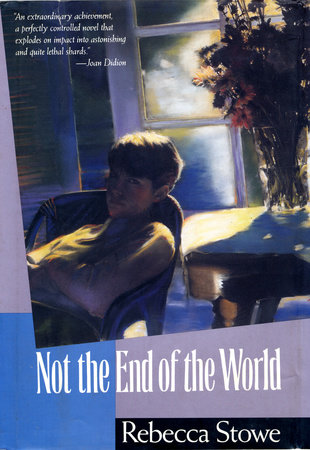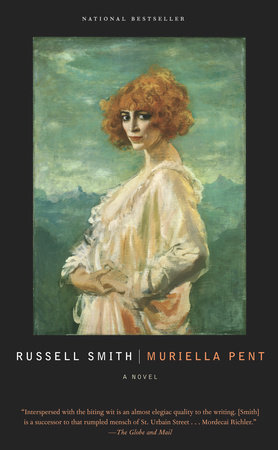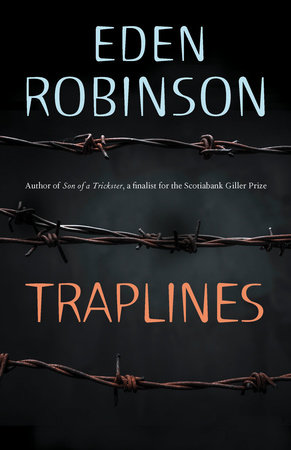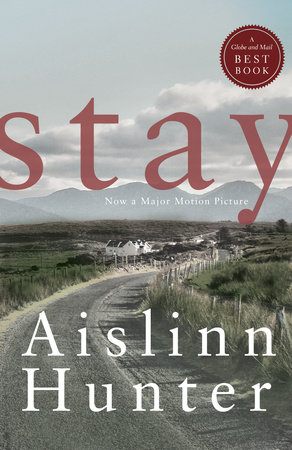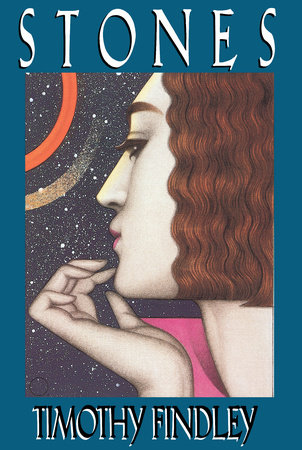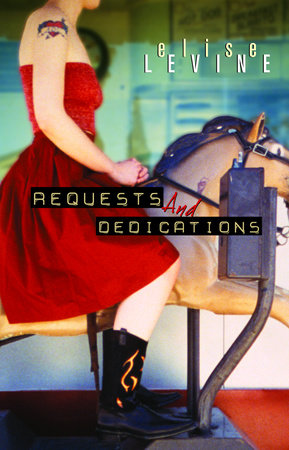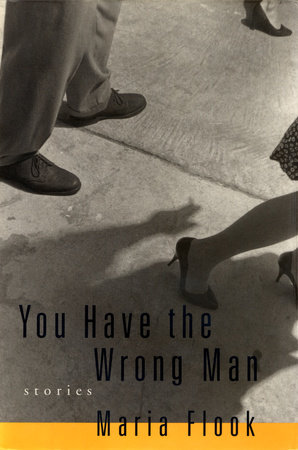Author Q&A
McClelland & Stewart: As a writer, you have been called a “cagey dominatrix of literary form” and “white hot,” yet your language in this novel is grounded in the human heart. How do you see the relationship between language and emotion?
Elise Levine:To me, form and style serve character, providing a way of translating human complexities – often unvoiced, difficult ones – with the greatest immediacy and clarity. My hope is that readers of Requests and Dedications will be able to engage as directly and viscerally as possible with the emotional intricacies of the characters’ lives, and to see how the emotional thrust of the novel powers the narrative toward tragedy and the possibility of resolution.
M&S: Your language is full of surprises and the unexpected, which enhances meaning and deepens the way we come to know your characters. How do you see that synergy working in the novel?
EL: In some ways, I see Requests and Dedications as being about the nature of human identity, so often in flux, capable of both imprisoning and transcending itself. I wanted to show these dustups and handshakes of the self, and the harum-scarum, love-hate twinings with other individuals. These intersections are what place people in a moral realm involving choices and responsibilities, and require the ability to imagine – and so empathize with – the lives of others.
I thought if I could find voice-appropriate language with an extended expressive range – at times dense and built-up, fiercely idiomatic and stubborn, at times simple in the extreme, and layer these polyphonally, almost – I could more accurately mirror the characters’ terrible struggles to understand themselves and others, and to articulate their feelings. And I thought that this might be the most effective way to allow the reader to access their drama.
M&S: Though you grew up in Toronto, you are now living in Chicago where your husband, a composer, is working on his Ph.D. Did the presence of music in your life have any influence on the use of music and radio in the novel? Can you discuss this use and the meaning of the title?
EL: Although I have little formal musical training, I suppose that thinking about music is part of the currency of my household. I’m often struck by the many similarities between fiction writing and composing music. I’m especially intrigued by the way some contemporary composers talk about writing music as a way of sculpting time. By controlling texture (tone colour or timbre, volume, density, counterpoint), rhythm (tempo, duration, attack points, acceleration or deceleration, repetition), and pitch (melody – pitches in a given sequence, and harmony – pitches played simultaneously), composers structure the listener’s experience of a certain interval of time. Certainly, fiction writers use similar techniques – as I do in this novel – to shape the reader’s experience, as well.
But with Requests and Dedications, I was also trying to get at the ways in which Walker, Mimi, and Tanis are haunted by the past – one of failed or sometimes fulfilled emotional obligations, the requests and dedications of the novel’s title that mirrors the call-in country music show that Tanis listens to on the radio. It made sense to me to capture this hauntedness – to attempt to evoke in the reader the characters’ psychic repetitions and fractures, the way their memories telescope and suspend their ability to function in the present and envision a hopeful future – by having music as a kind of floating element throughout the novel. So in the novel, the radio is on, with its babble of love and frustration, anger and hope. Walker’s dead mother speaks to him at night. Mimi’s refuses to speak – which in itself is a terrible eloquence.
Overall, I wanted not so much to describe music or detail the characters’ responses to it, as to use music as a metaphor – sometimes explicit, sometimes implicit to the extent the reader might only subconsciously intuit it.
M&S: Requests and Dedications is set in Markham, Ontario, where the countryside working poor encounter the middle class in their monster homes. This setting seems to be as much a character in the story as the people are. Why did you choose this particular border where two worlds meet as the setting for the novel?
EL: I think these kinds of borders – these fascinatingly odd, liminal places resulting from the implacable spread of suburbs into rural areas – are continuing to propagate across North America. They’re a very contemporary phenomenon affecting so many people. Growing up as I did in Toronto (Willowdale, actually – a Toronto suburb), a southern Ontario setting was the one I was most familiar with, and seemed a natural choice when it came to situating Tanis, Walker, and Mimi. Each is in some way rootless, clinging by the fingernails to what shreds of a sense of history and place they can – mostly very short-term ones, along which they must attempt to trace the contours of their personal history. Each is also in some way marginalized, not quite fitting comfortably within their skins and within the outside world. I wanted to characterize the setting as a kind of figural ground that echoes the experience of these people.
M&S: Your use of brand names as nouns and verbs is fun and familiar, hip and savvy. Was it a conscious decision on your part, to have your characters, particularly the eighteen-year-old Tanis, use this type of language?
EL: I felt I could employ brand names as another technique for engaging the reader directly in the experience of the characters’ lives. For better or for worse, I think brand names are part of the idiom of our day, acting as ciphers for the objects of desire to which we attach our longings and aspirations. I don’t know whether their place in daily speech and thought represents a shrinking or an increase in our expressive abilities – or, for that matter, an expansion or contraction of our moral qualities – but I felt I could use them to suggest a highly recognizable consumer-consciousness that’s partly ironic, given the impoverished situation of the characters.
M&S: It’s interesting the way in which you’ve elevated your characters through the language they use. Can you talk about this juxtaposition of language and class and how you’ve used it in the book?
EL: I’m not sure I’ve elevated the characters; I just tried to do right by them!
What drove me while working on this novel, was my desire to try to give voice to these difficult, at times silent characters – their thoughts and feelings so often painfully impacted, inaccessible even to themselves – and to do so in a way the reader could be moved by. The language I use to represent the character’s internal thoughts at times differs markedly from the simple yet charged, elided language of their direct speech. I felt this was the best way to access, and do justice to, such characters, to show them in the grip of the struggle to translate and communicate. To me, this is such a moving, human dynamic.
M&S: To expand on the question above, discuss this ability to speak in relation to the characters’ inability to express love.
EL: Part of the characters’ difficulty in expressing love stems from their experience of it as painful, rife with betrayals and failures and fears. The drama for Tanis, Walker, and Mimi is to find ways in which to overcome their limitations, and be able to give something – even if it comes in the guise of some truth or insight – that bespeaks their love.
M&S: Do you see the book as redemptive in the end?
EL: I like to feel the seeds are there, especially within Tanis. It’s her hard-won, nascent understanding that holds the promise of repairing the fissures not only within herself, but in some ways her uncle and even Mimi, as well.
M&S: What is the role of forgiveness in the book?
EL: Forgiveness features centrally throughout the novel, for each of the characters, including Tanis’s mother, Joy: forgiveness withheld, denied, difficult to discern, or accept – forgiveness of ourselves and of others.
M&S: Do you think your characters at the end of the book have overcome a sense of disappointment in their lives? Have they been able break free of the constraints they feel?
EL: In a way, and at some cost, each of the characters is poised to overstep their self-imposed bounds. I like to think that the novel’s ending is a threshold, a place the narrative has led to from which the reader is free to imagine the characters – even Mimi, in the only way possible for her – chastened by experience, but going forward.
M&S: It is extraordinary that you have, in this debut novel, captured brilliantly a range of characters, each profoundly human – Walker, a rough-edged, middle-aged horse dealer who lives behind a veneer of toughness and tries to hold his life together; his girlfriend, the glamorous Mimi who uses her charms to seduce all those around her; and Walker’s eighteen-year-old niece Tanis, tough, vulnerable, wise, who breaks away to the hip world of Toronto. In the process of writing the novel, were you aware of creating these characters or did they come to you?
EL: The characters came to me, years ago – I became aware of them. The lengthy writing process involved excavating, constructing, and revising what would be the concrete details of their lives and the idiosyncrasies of their voices.
M&S: What draws you to a particular work of fiction?
EL: I’m drawn to fiction that has a strong moral dimension – not necessarily in a conventional sense, but more along the lines of conveying the sense that a powerful empathetic imagination is at work. I’m also impressed by sheer skill – a bravura performance that takes my breath away. And, well, I’m a great fan of beauty! Which is a quality that’s hard to define, maybe existing when skill and moral insight are seamlessly interwoven. But I think it’s that quality that somehow takes you out of yourself, and comes in many guises, from the hard-edged, slow-to-reveal-itself kind, to the drop-dead-gorgeous variety that’s obvious the minute you lay your eyes on it.
M&S: Which writers have influenced your work?
EL: Virginia Woolf, Henry James, Mavis Gallant, Joy Williams, Denis Johnson, Michael Ondaatje, Margaret Atwood, Barbara Gowdy.
M&S: What are you reading now?
EL: Lisa Moore’s Open (I also loved her first book, Degrees of Nakedness), A.M Homes’s Things You Should Know, W.G. Sebald’s After Nature, and Raymond and Lorna Coppinger’s Dogs: A Startling New Understanding of Canine Origin, Behavior and Evolution.
